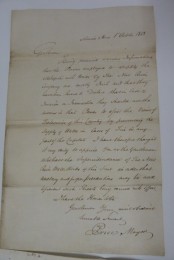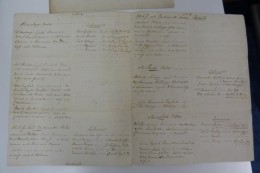A contentious historical legacy
Next » « PreviousThe Great Parchment Book is a hugely important record of the Ulster Plantation of the early 17th century documenting an important and formative period of the history of Britain and Ireland. The Plantation had significant implications for the politics of these islands and left a contentious historical legacy which still resonates today.
This legacy is also reflected in two documents in the latest exhibition at London Metropolitan Archives which relate to a later period – the time of the Napoleonic Wars. In 1803 French invasion seemed imminent, but there were serious problems within London too. Radicalism, industrial unrest and high food prices in the 1790s and 1800s led to plots and talk of revolution on which the government clamped down hard. The failed Irish Rebellion and French landings in Ireland of 1796-8 meant Irish labourers were seen as potential subversives within the capital.
The documents date from October 1803 and comprise a letter from the Lord Mayor to the New River Company concerning a threat by Irish workers to prevent the supply of water to put out fires in the event of a French invasion and a list of names of New River Company workmen analysing nationality, address, number of years employed and whether the individual had a wife and children (LMA reference ACC/2558/MW/C/15/361/001). The threat was taken very seriously as the list was sent to the Secretary at War. The New Company was the capital’s largest water company and supplied water to the City, and East and North London.
“War in London”, which reveals the effects of five conflicts on Londoners and their city from the English Civil War to the Cold War, runs at LMA until 27 April 2016.

